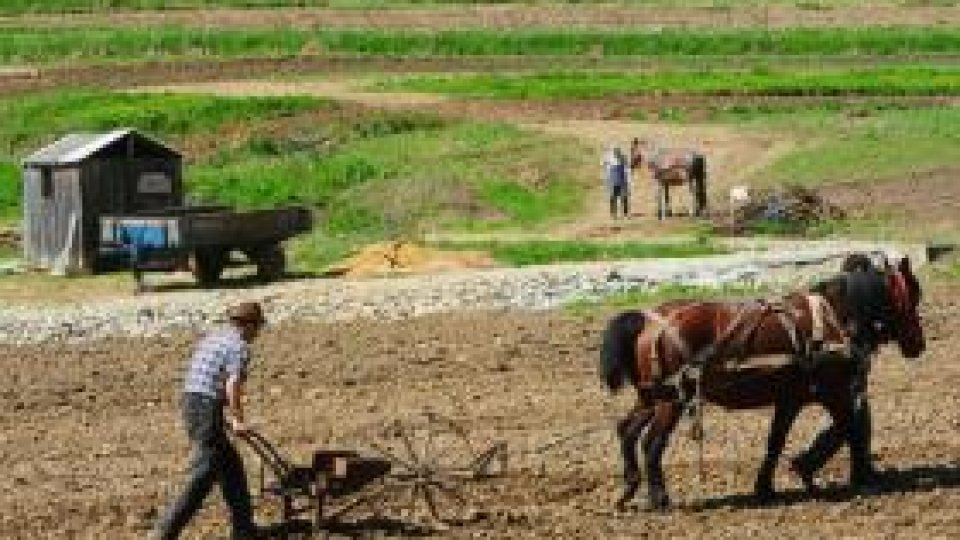Romanian farmers want land merging
The League Vice President Association of Agricultural Producers in Romania considers that the lack of agricultural land registration of Romania is a big problem for farmers and agricultural land should not be estranged but protected.

Articol de Ionuţ Dragu, 22 Martie 2012, 15:22
The League of Agricultural Producers Association of Romania (LAPAR) proposes the initiation of normative acts for merging agricultural land to take into account the wishes of the owners as well as the national interest, says the editor Radio Romania News, Florentina Varga.
The Minister of Agriculture and Rural Development, Stelian Fuia, said recently that it would be necessary to establish a land bank to assist in merging land and thereby to increase productivity Romanian agricultural holdings.
From 2013, foreigners can purchase agricultural land in Romania under the Treaty of Accession of's European Union (UE).
Currently, foreigners can buy land only through companies registered in Romania.
Romanian farmers have discussed several issues facing the conference ’How to correlate the proposed reforms of the Common Agricultural Policy for the period 2014-2020 with the Romanian farmers' own strategies.’
Romanian farmers complain about long delays and unreasonable repayment of the VAT, to maintain state aid for oil consumed in the agricultural production in the last year, considering that its price has increased by more than 15 percent.
Also, Romanian farmers complain about the lack of the state envolvment in achieving national land cadastre.
According to President LAPAR, Laurenţiu Baciu, ’Farmers do not beg advantages. They come up with solutions that lead to economic stability, performance and equality with their peers from countries with whom Romania is in 2007.’
Baciu Laurenţiu says that among the issues raised are ’complementary national direct not to grant payments in the amount established and approved by the European Union, 73.35 EUR, which seriously affects the production activities of Romanian farmers, financial unsuport in case of natural disasters caused by atmospheric and soil drought lightly extreme approach to irrigation systems, although it is known that water is the main limiting factor of agricultural production.’
’Possible area to be irrigated is currently at the level of 70,000 hectares of over three million hectares designed for this purpose before the 90’, says President LAPAR.
Romania, ’first in land sales to non-residents'
Vice President LAPAR, Daniel Ciobanu, says that lack agricultural land registration of Romania is a big problem for farmers and agricultural land should not be estranged but protected.
’The farmers from Romania have never ever requested prohibition of purchase of land acquisitions by foreigners, but we demand the same rights that they have in their country. There are protected by national legislation.’ says Daniel Ciobanu.
Vice President LAPAR says that Romania has become the first in land sales by non-residents.
’But then, what agricultural policies we talk, if we lose our holdings?’
’Our holdings are not protected. These things would be possible if we give up being humble.’ says Daniel Ciobanu.
LAPAR proposes the initiation of normative acts to merge land and to consider owners wishes, but also the national interest.
Reducing bureaucracy in agriculture, the EU objective
The agriculture ministers discussed on Tuesday, in Brussels, the next common agricultural policy reform elements for 2014-2020.
One of the European Commission intentions is to simplify this in order to reduce bureaucracy that faced farmers and authorities.
The bureaucracy would focus mainly on their work and the major projects taken under consideration.
Danish Minister of Agriculture, Mette Gjerskov said the discussion was successful and that the Danish Presidency has gathered many suggestions, both in debates but also in writing from the Member States.
The Commissioner for Agriculture, Dacian Cioloş assured that the simplification will remain one of the cornerstones of the ongoing discussion on reform of common agricultural policy.
Dacian Cioloş explained that he proposed ’specific direct payments to small farms, specific direct payments for young farmers or beekeepers in disadvantaged areas.’
The Commissioner for Agriculture also spoke about a moment that is now essential in discussions about common agricultural policy after 2014.
’We are at a crucial moment, because we plan together with the Danish Presidency of the Council and European Parliament rapporteurs that in the coming months, before summer, we could clarify items, technical aspects of the legislative proposals that require improvement or clarification and in this regard, the Commission will come with the explanatory documents on which Member States may decide which certain improvements to put on the table.’ said Dacian Cioloş.
The Commissioner for Agriculture said that European documents are necessary to ’identify clearly what are the few items that require a political decision and a full debate at political level in the second half of the year, so that we approach the end of a possible final decision regarding the reform.’
Dacian Cioloş suggested in last October, the the Common Agricultural Policy beyond 2014 to operate under new rules.
These rules will mean mainly a better targeting of payments for farmers, support for farmers correlation with environmental measures and aid for young farmers.
Translated by Ioana Vioreanu
MTTLC, Bucharest University














